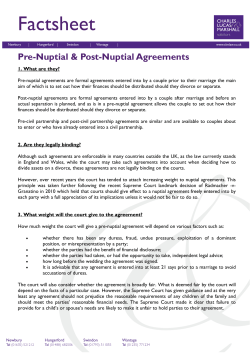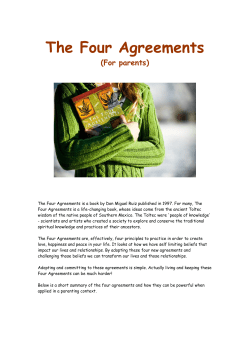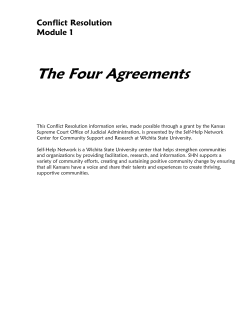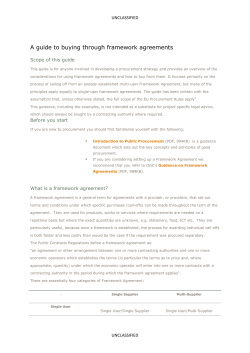
Resolution response to the Law Commission consultation: Marital property agreements
Resolution response to the Law Commission consultation: Marital property agreements Introduction Resolution‟s 5,500 members are family lawyers committed to the non-adversarial resolution of family disputes. Resolution solicitors abide by a Code of Practice which emphasises a constructive approach to family problems and encourages solutions that take into account the needs of the whole family and the best interests of any children in particular. Resolution as an organisation is committed to developing and promoting best standards in the practice of family law amongst its members and amongst family lawyers in general. Resolution explores and promotes other means of resolving family disputes, such as mediation and collaborative law, so that couples can negotiate solutions without using the courts. Many Resolution members also practice as mediators and collaborative lawyers and many are accredited by the organisation as specialists in particular aspects of family law, such as contact cases or financial aspects of separation. Resolution publishes various guides to improve standards of practice. Resolution provides training in law and in the skills and understanding that family lawyers need to help their clients face a difficult time. We also campaign for better laws and better support and facilities for families and children undergoing family change. Response Resolution‟s policy on marital agreements is set out in „Family Agreements – Seeking Certainty to Reduce Disputes: the Recognition and Enforcement of pre-nuptial and post-nuptial agreements in England and Wales (2009). Save for our proposal that any pre-nuptial agreement would not be binding if entered into fewer than 42 days before the marriage, which is discussed further below at 8.15, we stand by our policy. We remain of the opinion that the best and most appropriate way of recognizing and enforcing marital agreements would be by amendment of section 25 Matrimonial Causes Act 1973 to provide that the court would accept such agreements as binding subject to certain safeguards. We answer each of the questions posed by the Law Commission following its numbering: 8.1 General comments Whilst the bulk of marital agreements will deal with the financial consequences of separation, divorce and dissolution Resolution is concerned by the narrowing of the definition to marital property agreements. We see no reason why it should not be possible for parties to agree on other matters important to them such as religious upbringing of any children, alternative resolution of any disputes, confidentiality or jurisdiction. The consultation paper talks about the implications of reform for international couples but neither makes any proposals nor seeks any views on this aspect of the matter. If, subject to safeguards, agreements are to be binding, there will be more people from marital property regimes entering into them. Under article 4 (Council Regulation (EC) No 4/2009) a party can reach an agreement in relation to jurisdiction for maintenance (maintenance under Van den Boogaard v Laumen can include lump sum and property adjustment orders). The parties can agree to give jurisdiction on maintenance to any EU State where the parties are habitually resident or where the parties have their nationality. These conditions must either apply at the time the agreement is concluded or when the court is seised. This jurisdiction will be exclusive unless agreed otherwise and can be conferred on a ugano state which is not a ember State However, unlike russels I, the parties cannot agree jurisdiction in respect of child support Also, in order to prevent forum shopping, a debtor cannot seek a new decision (or the modification of an existing decision) in another Member State while the creditor remains habitually resident in the original ember State Article Maintenance agreements are enforceable under the regulation provided they are authentic instruments “which have been formally drawn up or registered as an authentic instrument in a ember State” Article 2 3 These authentic instruments must also be enforceable in the Member State of origin. Such an instrument therefore has the same force under the Regulation as a judgment and its recognition cannot be refused. Therefore a marriage contract/pre-marital agreement which provides for a nominal lump sum in lieu of maintenance and which includes an execution clause would be automatically enforceable in another Member State and would be binding on either party, subject to the power to vary (see above). Therefore if, in the future, a German heiress marries a French national and they enter into a marriage contract before a German notary, and if this contract contains: (a) an execution clause, which provides that it is directly enforceable as if it were a court order (b) provision that the German court has exclusive jurisdiction to deal with issues of maintenance; and (c) provision that neither party can make any financial claims (including for maintenance) against the other (or alternatively requiring the wealthier party to pay a nominal lump sum in lieu of maintenance to the weaker financial party and excluding all other claims); then the weaker financial party would not be able to bring a maintenance claim in Germany or anywhere else in the EU, including in England. Thus, if this had applied in the Supreme Court decision in Radmacher, the English court would not have been able to make any provision for maintenance (or indeed a home) on divorce. Of course, it would still have been able to make a Schedule 1 order, so the outcome in Radmacher may not have been greatly different. However, where there are no children, the English court will, after June 2011, be powerless in such circumstances to order maintenance on divorce, regardless of the length of the marriage. Of course, this would not, in theory, prevent the English court making orders which amount to a property division rather than maintenance but nevertheless this is something the Law Commission needs to take into account as it will be difficult to see in a lot of cases where the line would be drawn between maintenance and a property division. We note the Law Commission says that within Europe, it is only possible in Germany to contract out of maintenance obligations, hence the example above. However, whilst we accept that the scenario outlined above may not apply across all of Europe, we would be surprised if it is only possible in Germany Also, the Law Commission needs to take into account the new Hague Convention on maintenance which is not yet in force in the UK, as it contains similar provisions in respect of maintenance agreements. This again opens up the possibility of the English court having to enforce maintenance agreements (pre-marital agreements) from other Hague countries However, unlike under the Regulation, the English court can reject an order on the ground of public policy. Of course, the Supreme Court decision in Radmacher removed the public policy argument in respect of pre-marital agreements per se, but we still question whether, as a matter of public policy, the English courts would enforce an agreement which left a wife with children without maintenance and, therefore, reliant on the State It should also be borne in mind that the UK courts have the ability to opt out of this article in the Hague Convention. Our view is that it would be wrong to have pre-marital agreements that are binding in England in respect of a German couple, but not in respect of an English couple in similar circumstances. 8.2 Impact assessment Resolution has undertaken a survey of its members. 83.5% of those responding had advised on a marital agreement in the last year. The majority were on pre-marital agreements, were concluded and signed and the wedding went ahead. Few actually involved a party who was a non-UK national and few required a foreign law to be applied to the agreement. The results of the survey are set out below1 1. In the last 12 months/last billing year/last financial year of your professional practice how many marital agreements did you personally advise upon? None 99 16.5% Under 5 353 59% 5 to 10 108 18 10+ 40 6.5% 2. Of those files, how many were pre marital agreements? All 232 47% Most 136 27% Minority 127 26% 3. Of those clients that made enquiries or for whom you provided advice on marital agreements, how many actually concluded and signed the agreement? All 117 22.8% Most 206 40.1% Minority 86 16.7% None 105 20.4% 1 600 Resolution members responded to the survey (about 11%). They did not all answer all the questions. 4. Of those clients you advised on pre marital agreements what proportion decided after advice not to go ahead with the marriage? All 17 3.4% Majority 23 4.6% Minority 107 21.4% None 354 70.6% 5. Of those cases in which you gave advice about a marital agreement what proportion involved at least one party who was a non-UK national? All 17 3.3% Majority 46 9% Minority 141 27.5% None 308 60.2% 6. Of those for whom you provided advice how many wished to have a foreign law applied to the terms of the agreement? All 3 0.6% Majority 10 2% Minority 60 11.9% None 432 85.5% 8.3 Contractual validity and public policy The proposal that for the future an agreement made between spouses, before or after marriage or civil partnership, shall not be regarded as void, or contrary to public policy, by virtue of the fact that it provides for the financial consequences of a future separation, divorce or dissolution takes us little further than the Supreme Court decision in Radmacher v Granatino. However this aspect of the decision was obiter and it remains possible that the Supreme Court, faced with a different factual context, could arrive at a different decision. Resolution agrees that the matter should be placed beyond doubt. There is no reason for different principles to apply to prenuptial and post-nuptial agreements 8.4 Should a new form of qualifying nuptial agreement be introduced that provides for the financial consequences of separation, divorce or dissolution and excludes the jurisdiction of the court in ancillary relief? Resolution does not agree that qualifying nuptial agreements should exclude the jurisdiction of the court in ancillary relief. At present unless a court order for all forms of ancillary relief/financial provision is made upon divorce, whether by consent or not, it is open to the parties to make a claim at any time thereafter. It would be negligent for a lawyer to fail to secure such a court order for a client. The Law Commission proposes that the court‟s jurisdiction should be ousted so that no such order would be required. Instead the parties would enforce the qualifying nuptial agreement, if need be, through the county court or Queen‟s ench or Chancery Divisions of the High Court. Resolution does not accept that the enforcement of such agreements should be dealt with on a purely contractual basis but should be considered by a family court in the context of the financial consequences of family breakdown To say that „qualifying nuptial agreements‟ would „provide a defence to an application for ancillary relief‟ but that non-qualifying nuptial agreements would remain part of the section 25 exercise would mean that a party challenging whether a nuptial agreement qualified would have to go to the county court or Queens Bench/ Chancery Division first and if successful would then issue an application for ancillary relief to which section 25 would apply. The family court would still be able to consider the agreement as part of the circumstances of the case and so this would add another layer of litigation. If the purpose of any primary legislation is to provide autonomy and certainty for parties but with a safety net of either needs/substantial hardship/significant injustice, then in the same way as solicitors and/or parties submit a minute of order which reflects the previously entered into separation agreement, so Resolution anticipates an order reflecting the marital property agreement being given to the court. It would also be helpful for enforcement in overseas jurisdictions if there was a consent order rather than seeking to enforce the terms of contractual agreements. The Law Commission highlights that if there was no consent order there might be tax implications – for example the date of a court order rather than the date of an agreement determines the date of disposal of the relevant assets for CGT purposes. This should not be overlooked. 8.5 If so, should such agreements be able to contain only terms relating to preacquired, gifted or inherited property? Resolution does not agree that qualifying nuptial agreements should be able to contain only terms relating to pre-acquired, gifted or inherited property. This would mean that any other matters would still have to be resolved by the court and there is no reason why the parties should not be able to reach agreement on all matters. To limit the terms in this way would seem to be a backward step following the Supreme Court decision in Radmacher v Granatino. We believe that agreements should be unlimited in scope. If there is any argument about the fairness of such an agreement it can be considered by the family court in the round under the proposed safeguards/our proposed amendments to section 25. If the family court was only permitted to consider anything acquired during the marriage or civil partnership or the terms of a marital agreement dealing with such property, without taking into account any agreement about pre-acquired, gifted or inherited property, this could lead to unfairness. 8.6 Should the reform of the law relating to marital property agreements be postponed to await a wider review of the law of ancillary relief? The reform of the law relating to marital property agreements should not be postponed to await a wider review of the law of ancillary relief. The section 25 Matrimonial Causes Act 1973 criteria generally work well. Uncertainty has arisen since the decisions in White v White and Miller v Miller, McFarlane v McFarlane but it is widely accepted that it would be difficult to address such uncertainty whilst retaining discretion. The situation would be largely improved by the recognition of marital agreements. If and when the law of ancillary relief is reviewed there is no reason why marital agreements should not be available to parties ready and willing to reach agreement. 8.7 Contractual validity We agree that marital agreements should be valid contracts i.e. they should be in writing, signed by both parties, made with an intention to create legal relations and supported by consideration. It is anticipated that the recitals of marital agreements will expand to explain the circumstances in which each party is entering into such an agreement. Whilst it may not be possible, as a matter of public policy, to fetter the English court‟s powers e g under s1/ Children Act 19 9 such recitals, whilst not binding, could be useful in terms of reflecting the intention of the parties at the time of entering into the agreement Under s25 these would be „circumstances of the case‟ 8.8 Do consultees think that the law relating to undue influence would require reform, for qualifying nuptial agreements only, in order to ensure that they were not too readily challenged or overturned? Resolution has proposed that an agreement would not be binding if it was entered into as a result of "unfair pressure or unfair influence". We adhere to this wording and formula. We believe that it has the benefit of clarity and is suitable for this area of law. While reference could be made to "undue influence" (instead of "unfair influence") we think that that harks back to and has onerous connotations with commercial and ordinary civil law. It carries with it a morass of case law applicable to those areas; whereas in the field of marital agreements we see benefit in having a simple formula which is easily understood by lay people as well as practising lawyers and the judiciary. Procedural fairness should be the test by which agreements are judged, and "unfair pressure or unfair influence" are appropriate criteria. In NA v MA [2007] 1 FLR 1760, at paras [11] to [22], Baron J considered the preexisting law about agreements between husbands and wives and did so in the context of Edgar v Edgar, which included a reference to "undue pressure". We suggest that there is tacit support both in Edgar and in NA v MA for not importing into this area of the law concepts from commercial and civil law such as "undue influence". We refer to the fact that in the former case Ormrod LJ made the point that it was "not necessary in this connection to think in formal legal terms, such as misrepresentation or estoppel; all the circumstances as they affect each of two human beings must be considered in the complex relationship of marriage." He referred to "undue pressure", but not to "undue influence". To like effect, in NA v MA, having reviewed banking and other commercial cases about undue influence, Baron J referred to the need to take special care in a case involving husband and wife and said that the law as identified by the House of Lords in Royal Bank of Scotland v Etridge (No. 3) "requires some modification for the special relationship between spouses". The same applies, we think, to the special relationship between those about to enter into marriage. All that said, we would not resist strongly if the Commission were to prefer a test of "unfair pressure or undue influence". 8.9 Signed writing We agree that marital agreements should be in writing and signed by both parties. 8.10 The consequences of failure to make disclosure We agree that marital agreements should not be binding unless there has been material full and frank disclosure. In our policy document we suggested the wording “substantially full and frank disclosure” We agree that the use of the word “material” allows for assessment of the importance of a particular disclosure. 8.11 Should parties be able to waive their rights to disclosure? We do not agree that parties should be able to waive their rights to disclosure. We can see the benefit from an autonomy point of view but this approach would not sit well with a fairly made agreement. To achieve autonomy, parties need to understand within a legal and financial context what responsibilities they are taking on or rights they are giving up. Guidance on the minimum type of financial disclosure will be of assistance. Most documents in England have an agreed schedule of assets akin to that provided in an FDR for a District Judge or that contained with a Form D81. Parties, their advisers and the judiciary should be in the same position to assess whether or not what has been provided is within the range of the possible outcomes and whether or not it meets the minimum criteria set by the Law Commission on quantum. 8.12 The effect of failure to take advice We remain of the view that both parties should have a reasonable opportunity to receive independent legal advice about the terms and effect of the agreement. As we stated in our policy document the alternative would provide a mischievous party with a means of escaping terms to which he or she was in fact willing to agree. In other words, they might decide not to obtain legal advice just so that they could argue later that they lacked advice and should not be held to the terms of the agreement. We also took into account that requiring people to take legal advice, and thus incur legal fees, was a potential financial burden on them and an infringement of their freedom to make their own decisions. Our final consideration was that there remain safeguards for the very rare situations where a party has been taken advantage of by an absence of independent legal advice; namely our proposed provisions whereby the agreement would not be binding if there had been "unfair pressure or unfair influence" or if upholding the agreement would cause "substantial hardship". 8.13 Proof of legal advice We agree in principle that in order to prove that legal advice has been given it shall be necessary to show that the lawyer advised the party against whom the agreement is sought to be enforced about the effect of the agreement on the rights of that party and the advantages and disadvantages, at the time the advice was provided, to that party of making the agreement. However, since the decision of Radmacher v Granatino it is necessary to consider the age, maturity and experience of the parties so it is a huge task. It is important to recognize the practicalities of any requirements. It would be a matter of evidence what advice was given. 8.14 Joint legal advice We do not believe that there are any circumstances where the requirement for legal advice could be met by having the same lawyer advise the two parties. The European model would not work in England and Wales. The same lawyer could not give the certificate anticipated in paragraph 6.94. The lawyer should be giving independent legal advice and not just information. 8.15 A timing requirement In our policy document we proposed that a marital agreement should not be binding if entered into within 42 days of the marriage. We accept that any deadline is arbitrary and diverts the pressure to another day. We suggest that the time when the agreement was signed should be one of the factors taken into account when considering whether there was unfair pressure or unfair influence on either party. 8.16 The content of the agreement We do not believe that there should be any further prescription about the formation or content of the agreement beyond what is proposed. 8.17 Variation of a qualifying nuptial agreement We agree that any variation should comply with all the pre-requisites for the formation of a marital agreement. 8.18 Prejudice to children and to the public purse: two inescapable provisos We are not attracted by the proposal that agreements should be able to be varied or set aside to the extent that they make insufficient provision for the children of the family. We suggest that the term „insufficient provision‟ is too vague In our policy document we suggested that the agreement would not be binding if enforcing it would cause substantial hardship to either party or the children of the family and we believe that this is a better way of approaching it. 8.19 Further safeguards: the options Of the 5 options for safeguards we prefer (3) provision for the agreement to be varied or set aside by the court if it produced significant injustice. It may help to define the difference between „significant injustice‟ and „failed to meet the parties‟ needs narrowly defined‟ 8.20 Identifying property over time It is already common practice to make provision in the agreement for how property is to be identified over time. We are concerned about what status any rules would have and the likely satellite litigation they would create. There would have to be so many rules that they could become too prescriptive. It would be better to have more flexible guidance. 8.21 Should investment or mixing give rise to shared ownership, or a right to reimbursement? The question of whether investment or mixing should give rise to shared ownership or a right to reimbursement would be a matter of drafting. 8.22 Binding marital property agreements and the I(PFD) Act 1975 We agree that such agreements should be able to restrict or modify the ability of either party to apply to the court for family provision under the I(PFD) Act 1975 save insofar as application is made for maintenance. For further information please contact Jacqui Jackson, Director of Standards, Resolution at Jacqui.jackson@resolution.org.uk or 01926 840107. Resolution 11.04.11
© Copyright 2025


















